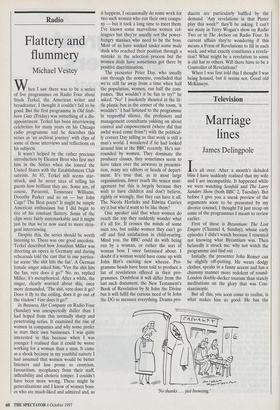Radio
Flattery and flummery
Michael Vestey
When I saw there was to be a series of five programmes on Radio Four about Studs Terkel, the American writer and broadcaster, I thought it couldn't fail to be good. But the first programme in Old Stub- born Guts (Friday) was something of a dis- appointment. Terkel has been interviewing celebrities for many years on his Chicago radio programme and he describes this series as 'an archival journey' with clips of some of those interviews and reflections on his subjects.
It wasn't helped by the rather precious introduction by Eleanor Bron who first met him in the Sixties when she toured the United States with the Establishment Club satirists. At 85, Terkel still seems star- struck, and he never tires of telling his guests how brilliant they are. Some are, of course, Pavarotti, Tennessee Williams, Dorothy Parker and so on — but John Cage? The Beat poets? It might be simple American enthusiasm but I did begin to tire of his constant flattery. Some of the clips were fairly unremarkable and it might just be that we're now used to more strin- gent interviewing.
Despite this, the series should be worth listening to. There was one good anecdote. Terkel described how Jonathan Miller was directing an opera in Germany and during rehearsals told the cast that in one particu- lar scene 'the shit hits the fan'. A German female singer asked him, Nen the shit hits the fan, vere does it go?' No, no, replied Miller, it's metaphorical. After a while, the singer, clearly worried about this, once more demanded, 'The shit, vere does it go? Does it fly to the ceiling, does it go out of the vindow? Vere does it go?'
In Business, Her Company on Radio Four (Sunday) was unexpectedly duller than I had hoped from this normally sharp and penetrating series. It examined the rise of women in companies and why some prefer to start their own businesses. I was quite interested in this because when I was younger I realised that it could be worse working for a woman than a man. It came as a shock because in my youthful naivety I had assumed that women would be better listeners and less prone to cronyism, favouritism, sycophancy from their staff, inflexibility and choleric temper. I couldn't have been more wrong. These might be generalisations and I know of women boss- es who are much-liked and admired and, as it happens, I occasionally do some work for two such women who run their own compa- ny — but it took a long time to meet them. I've known some marvellous women col- leagues but they're usually not the power- hungry maniacs who need to be the boss. Most of us have worked under some male duds who reached their position through a mistake in the selection process but the women duds have sometimes got there by positive discrimination.
The presenter Peter Day, who usually cuts through the nonsense, concluded that we're still far away from a time when half the population, women, run half the com- panies. 'But wouldn't it be fun to try?' he asked. 'No!' I insolently shouted at the lit- tle plastic box in the corner of the room, 'it wouldn't.' I had listened to the programme in respectful silence, the professors and management consultants yakking on about control and empowerment (where did that awful word come from?) with the political- ly correct Day telling us that work is still a man's world. I wondered if he had looked around him at the BBC recently. He's sur- rounded by women. They dominate the producer classes, they sometimes seem to have taken over the airwaves in presenta- tion, many are editors or heads of depart- ment. It's true that, as in most large organisations, fewer reach the senior man- agement but this is largely because they wish to have children and don't believe, rightly or wrongly, that they can have it all. The Nicola Horlicks and Edwina Curries try it but who'd want to be like them?
One speaker said that when women do reach the top they suddenly wonder what it's all for. It crosses the minds of some men too, but unlike women they can't go off and find satisfaction in child-rearing. Mind you, the BBC could do with being run by a woman, or rather the sort of woman boss I once fantasised about. I doubt if a woman would have come up with John Birt's exciting new wheeze. Pro- gramme heads have been told to produce a list of revelations offered in their pro- grammes. Doubtless it will differ from the last such document, the New Testament's Book of Revelation by St John the Divine but it will fulfil the curious need of St John the DG to measure everything. Drama pro- ducers are particularly baffled by the demand. 'Any revelations in that Pinter play this week?' they'll be asking. I can't see many in Terry Wogan's show on Radio Two or in The Archers on Radio Four. In current affairs they're wondering if this means a Form of Revelations to fill in each week, and what exactly constitutes a revela- tion? What might be a revelation to some is old hat to others. Will there have to be a Controller of Revelations?
When I was first told this I thought I was being hoaxed, but it seems not. Good old McKinseys.










































































 Previous page
Previous page